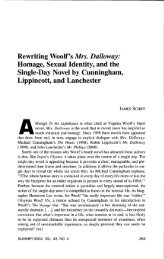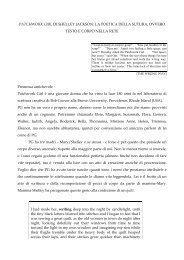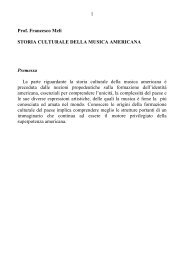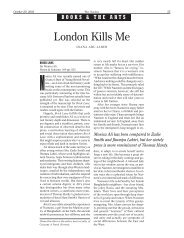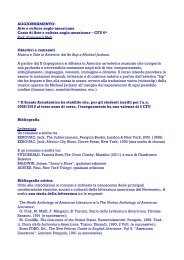Walden, Henry David Thoreau - Paola Carbone
Walden, Henry David Thoreau - Paola Carbone
Walden, Henry David Thoreau - Paola Carbone
You also want an ePaper? Increase the reach of your titles
YUMPU automatically turns print PDFs into web optimized ePapers that Google loves.
more I than it is you. When the play, it may be the tragedy, of life is over, the spectator goes hisway. It was a kind of fiction, a work of the imagination only, so far as he was concerned. Thisdoubleness may easily make us poor neighbors and friends sometimes.[12] I find it wholesome to be alone the greater part of the time. To be in company, even with thebest, is soon wearisome and dissipating. I love to be alone. I never found the companion that was socompanionable as solitude. We are for the most part more lonely when we go abroad among menthan when we stay in our chambers. A man thinking or working is always alone, let him be wherehe will. Solitude is not measured by the miles of space that intervene between a man and hisfellows. The really diligent student in one of the crowded hives of Cambridge College is as solitaryas a dervish in the desert. The farmer can work alone in the field or the woods all day, hoeing orchopping, and not feel lonesome, because he is employed; but when he comes home at night hecannot sit down in a room alone, at the mercy of his thoughts, but must be where he can “see thefolks,” and recreate, and as he thinks remunerate himself for his day’s solitude; and hence hewonders how the student can sit alone in the house all night and most of the day without ennui and“the blues”; but he does not realize that the student, though in the house, is still at work in his field,and chopping in his woods, as the farmer in his, and in turn seeks the same recreation and societythat the latter does, though it may be a more condensed form of it.[13] Society is commonly too cheap. We meet at very short intervals, not having had time toacquire any new value for each other. We meet at meals three times a day, and give each other anew taste of that old musty cheese that we are. We have had to agree on a certain set of rules, calledetiquette and politeness, to make this frequent meeting tolerable and that we need not come to openwar. We meet at the post-office, and at the sociable, and about the fireside every night; we live thickand are in each other’s way, and stumble over one another, and I think that we thus lose somerespect for one another. Certainly less frequency would suffice for all important and heartycommunications. Consider the girls in a factory — never alone, hardly in their dreams. It would bebetter if there were but one inhabitant to a square mile, as where I live. The value of a man is not inhis skin, that we should touch him.[14] I have heard of a man lost in the woods and dying of famine and exhaustion at the foot of atree, whose loneliness was relieved by the grotesque visions with which, owing to bodily weakness,his diseased imagination surrounded him, and which he believed to be real. So also, owing to bodilyand mental health and strength, we may be continually cheered by a like but more normal andnatural society, and come to know that we are never alone.[15] I have a great deal of company in my house; especially in the morning, when nobody calls.Let me suggest a few comparisons, that some one may convey an idea of my situation. I am nomore lonely than the loon in the pond that laughs so loud, or than <strong>Walden</strong> Pond itself. Whatcompany has that lonely lake, I pray? And yet it has not the blue devils, but the blue angels in it, inthe azure tint of its waters. The sun is alone, except in thick weather, when there sometimes appearto be two, but one is a mock sun. God is alone — but the devil, he is far from being alone; he sees agreat deal of company; he is legion. I am no more lonely than a single mullein or dandelion in apasture, or a bean leaf, or sorrel, or a horse-fly, or a bumblebee. I am no more lonely than the MillBrook, or a weathercock, or the north star, or the south wind, or an April shower, or a January thaw,or the first spider in a new house.[16] I have occasional visits in the long winter evenings, when the snow falls fast and the windhowls in the wood, from an old settler and original proprietor, who is reported to have dug <strong>Walden</strong>Pond, and stoned it, and fringed it with pine woods; who tells me stories of old time and of neweternity; and between us we manage to pass a cheerful evening with social mirth and pleasant views4



